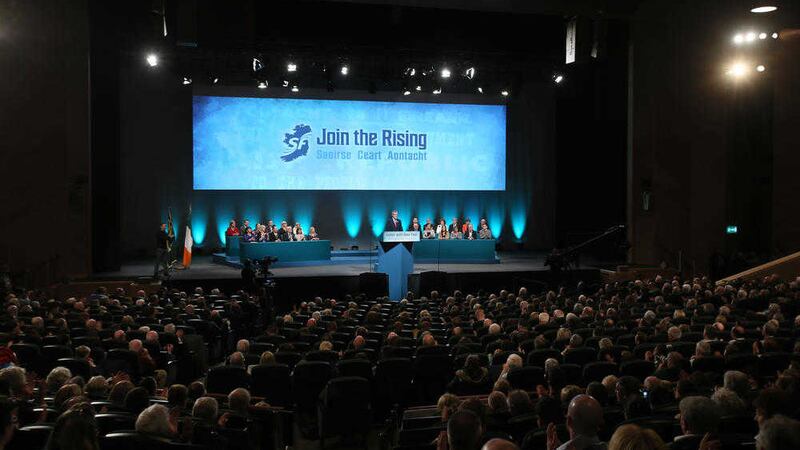THE next Dublin government has to tackle "ingrained partitionist thinking" and do more to promote cross-border co-operation, Sinn Féin president Gerry Adams has said.
Speaking at his party's ard fheis in Dublin on Saturday night, the Louth TD said the Republic's government needed to enlist international support to build better relationships between north and south.
Mr Adams's speech at Dublin's Convention Centre brought Sinn Féin's two-day annual national conference to a close. Around 2,000 delegates attended the weekend event, which fell on the eve of the 100th anniversary of the 1916 Easter Rising. The ard fheis featured a number of performances to mark the centenary and yesterday the commemorations continued with a reading of the 1916 proclamation outside the GPO on O'Connell Street.
Like the conference itself, the Sinn Féin leader's speech focused on the theme of the Rising. He said there had been an attempt to "denigrate the heroes of 1916" through "shameful revisionism"
He said it had been claimed that James Connolly, Patrick Pearse and their comrades were wrong and that the British had been prepared to grant Irish independence.
"Those who claim that honouring the 1916 leaders might justify violence, have nothing to say of Redmond and Carson’s role in sending a generation of young Irishmen in the Irish Volunteers and Ulster Volunteers to fight Germans, Austrians and Turks, with whom they had no quarrel," Mr Adams said. "....were John Redmond and Edward Carson not men of violence?"
The Sinn Féin president criticised the notion that the Rising leaders' proclamation of a Republic was fulfilled.
He said much had changed over the past century and that the union was "no longer unconditionally upheld in British law".
"The British government is now obliged to legislate for Irish unity if a majority wants that – the duty of the Irish government is to achieve this," he said.
"That means promoting all-Ireland co-operation and building relationships between our people. It means an end of partitionist thinking by policy makers; and yes – in the media also."
The Sinn Féin leader said a "peaceful and democratic route" to Irish unity now existed.
In a speech which included few direct references to the north, he commended Deputy First Minister Martin McGuinness for his role in negotiating the Fresh Start Agreement and "building the peace".
"Sinn Féin have stood against the British Tory austerity policies," he said.
"We stopped the introduction of water charges and we guaranteed free hospital care, free GP care and free prescriptions."
However, Mr Adams voiced his disappointment that same sex marriage was still illegal north of the border and said his party had pledged to change the law. He also insisted that Sinn Féin was committed to an Irish Language Act and rights for Irish speakers.
"No other party will stand up for these rights in the face of unionist bluster, British government opposition and the Irish government's indifference," he said.
He said Sinn Féin believed in a "different European Union" but would be campaigning for a vote against Brexit.
"The imposition of border controls and economic barriers are not in the interest of the people of this island," he said.
Mr Adams said his party had returned 23 TDs in February's Dáil election despite a "tsunami" of negative campaigning by opponents and sections of the media.
He said Fine Gael and Fianna Fáil had refused to talk to Sinn Féin after the poll and claimed the party was not fit for government.
The Louth TD said Fianna Fáil leader Micheál Martin was reneging on his pledge not to put Enda Kenny back into government.
"But he would prefer to put them back in government as part of his effort to counter the growth of Sinn Féin," he said.







